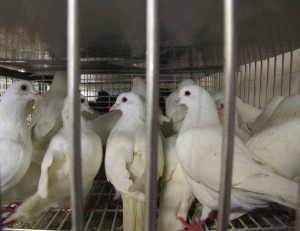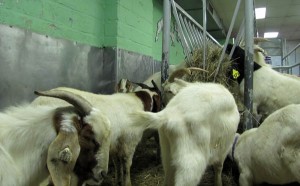

Mohamed Haroun rings up a purchase of three chickens bought by a Hispanic woman.
“Veinte dolares,” he says, practicing his Spanish, and runs her credit card through the machine.
Born in Egypt and raised in New York City, Haroun was not expecting to work in his father’s Halal slaughterhouse. Tucked away in Northwest Philadelphia, Al Baraka, which means blessing in Arabic, is one of only two Halal live animal butchers in the city. Halal, which means legal or permissive in Arabic. Slaughtering must be done in the name of Allah and contain no blood when sold. Muslims also cannot eat pork under religious law.
During Eid, a Muslim celebration, Al Baraka is overflowing with orders. Each year the store sells around 300 sheep and goats, and this past year they sold nine whole cows too. The price for a sheep is around $170 and up to $900 for a cow or bull. The shop is open to the public and offers delivery too. But the most common animals sold are live chickens.

Haroun says the majority of his Muslim customers are South Asian or African American, but he also gets a lot of non-Muslims.
“I think most people who come like the fact that their meat is not frozen,” he says. “it just tastes so much better and even cooks differently when it’s fresh.”
Haroun graduated from Columbia University in 2008 with a degree mechanical engineering and is interested in sustainable engineering. Most of the opportunities in his field right now are internships, so he is saving up money to travel and might return to Egypt for work.

Haroun is a Sunni Muslim, but he attends a mosque in Fairhill. He was surprised to notice differences between the Philadelphia Muslim communities and those in New York.
“I feel like there is a definite middle ground that is not covered here in Philadelphia. The mosques here feel more culturally separated,” he says. “Arabs go to that one, and Palestinians only attend this one, and Africans another.”
While in college Haroun was involved in the Muslim Student Association to promote understanding through community outreach. “I just feel that it’s really important for people to understand that the Muslim community is not homogeneous. There are many different interpretations of Islam, even non-religious Muslims who prefer spirituality,” he says.
“For example, to my understanding, the niqab (face covering) is not mandatory in Islam. And the Qur’anic verses that talk about the hijab are not absolutely clear about its definition. Regardless, I think it is up to the woman to decide,” he adds.
Philadelphia historically has always had a large Muslim population. and in 1990 a telephone survey was conducted by The City University of New York and found that there were 19,200 Muslims living here. Since then the population has grown, but there are not clear estimates by how much.
The U.S. Census does not ask for religious affiliation. Neither does Immigration and Naturalization Services, so special interest groups submit estimates. The Mosque Study project, funded by Counsel on American-Islamic Relations (CAIR), estimates there are six to seven million Muslims in the United States. The National Opinion Research Center, funded by the American Jewish Committee, estimates only one to three million Muslims live in the United States.
After Sept. 11, 2001, many people have felt fearful and wanted to take revenge on the Muslim population in the United States. Haroun’s mother used to work for an Islamic school in New York. For the month following the attack people would throw pork products at the building and yelled obscenities. Muslims do not eat pork because it’s not Halal. This past August, a Muslim cab driver in New York was brutally stabbed after his passenger asked if he was Muslim.
Philadelphia isn’t immune to discrimination of Muslims or even violence. Days after the 2001 attack, Jamillah Pugh was walking in the Gallery Mall on Market Street when two white men began to threaten her.
“They hit me so hard in my face,” she says. “In front of everybody, security, police all saw it happen and there was nothing they could do.”
Pugh didn’t press charges or even report the incident to the police. She has a different approach to this violence.
“You have to be patient. Islam teaches that, [and] those sins are on them, not me. You can’t react to everything,” she says.
That day might have been the worst, but Pugh says she regularly gets nasty comments in public because of what she wears. Pugh wears very modest Islamic dress: She dons a black abaya–a floor-length dress with matching hijab and niqab–a face veil that leave only her eyes available to the public view. She is Sunni-Salafi Muslim, which is the predominant interpretation at the Germantown Masjid where she is a member.

Pugh grew up in Germantown and remembers when her mother converted to the Nation of Islam at 15. She has always identified as Muslim but left the Nation of Islam.
“As I got older I realized that the Nation was really more about black power but wasn’t true Islam,” she says.
Pugh is an entrepreneur. She started her own clothing and cosmetics line called Najmun and sells in a virtual flea market here.
She also has a table in front of the Masjid in Germantown during Friday prayer. On the weekends Pugh holds her own flea market at 41st Street and Girard Avenue. She sits in a lawn chair wearing a denim jacket over her abaya. While we are talking, her children peer out of her van and start to play tag in the grassy lot.
“I’m really happy to be able to raise my children in [traditions of] Islam. I never watched television when I was growing up either and I feel like we are a close family because of it,” she says.

Pugh has a bachelor’s degree and had worked for the city for a while, but she loves being an entrepreneur. But ever since she started volunteering as an English as a Second Language (ESL) teacher for Iranian women, she had a change of heart.
Pugh says she wants her children to see more of the Middle Eastern world so they can see what an Islamic society is like.
“I want to move to Saudi Arabia and teach them English, I’ve already got my teaching certificate so I’m just saving up for it now.”
Despite her hopes, she knows it’s a difficult time to practice Islam, let alone travel as a Muslim woman.
Pugh said, “I don’t think that it’s going to get better. There is a war on Islam. Like right now it’s getting harder and harder for Muslims to gather in Yemen every day to pray.”


Be the first to comment